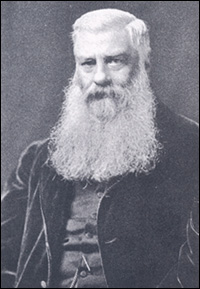A short biography of George Alfred Henty -- A GREAT Briton!!

G. A. Henty (1832 - 1902).
A contemporary of George Alfred Henty once described him as a man of strong will, reasonable ambitions and a hard, steady worker. He also said that Henty was a burly man with a good humored English sort of face, who always smoked a short, well-colored clay pipe.
Henty was born on December 8, 1832 at Trumpington, near Cambridge, England. He was the eldest son of a stockbroker. He was educated at Westminster School and at Cambridge, where he enrolled in 1852, but he left without obtaining a degree.
With the outbreak of the Crimean War in 1854, Henty and his brother joined the British Army. They were put on the commissariat staff of a hospital, where they were concerned with supplying food for the staff and patients. In 1855, they were sent to the Crimea. The following year, Henty's brother died of cholera.
Henty wrote about some of his war adventures in a series of letters which described the siege of the Russian fortress of Sevastopol. The letters were accepted for publication by a newspaper, but Henty did not show any interest then in writing as a career.
During his service in the Crimea, Henty was stricken with a fever and sent home. When he recovered, he was honored for distinguished service and given a promotion. He was selected to organize the Italian
hospitals during the war between Austria and Italy. After this, he held posts in the commissariats at Belfast, Ireland and Portsmouth, England.
When Henty began to tire of his work, he resigned his commission and returned home. He got a job assisting his father in the management of a coal mine in Wales. But after being sent to Sardinia to manage another mine, Henty found he did not like this type of work either, and he decided to become a professional writer.
In 1865, he began writing articles for a British newspaper called The Standard. The following year, the paper sent him to cover the continuing Austrian-Italian conflict. He also saw some of the Franco-Prussian War and was at the opening of the Suez Canal, His adventures continued with his presence in Russia during a revolution and in Africa with a British expedition.
In 1894, Henty reported on guerrilla warfare in Spain. The following year, he went on a tour of India with the Prince of Wales, later Edward VII of England. And a year after that, Henty was watching warfare between the Turks and the Serbians.
When not reporting, Henty was writing books. His first book for boys, Out on the Pampas, was published in 1868. After this he became quite well known, and he, felt he had finally found his true occupation.
Henty wrote about eighty books for boys. A young man who worked as his secretary for two years said that Henty used to walkup and down his study smoking his clay pipe and reeling off stories just as fast as the secretary could take them down. Henty's books include: In Freedom's Cause, Under Drake's Flag, In Times of Peril, The Lion of the North and In the Reign of Terror.
In his later life, Henty took a trip to the gold fields of California, but it wore him out. His last years were spent quietly. He died aboard his yacht on November 16, 1902.
Editor's Note
Mr. Henty's great books are now published by an American publisher, PrestonSpeed Publications. This is the type of Anglo-American cooperation we need -- not the military alliance against Iraq!!